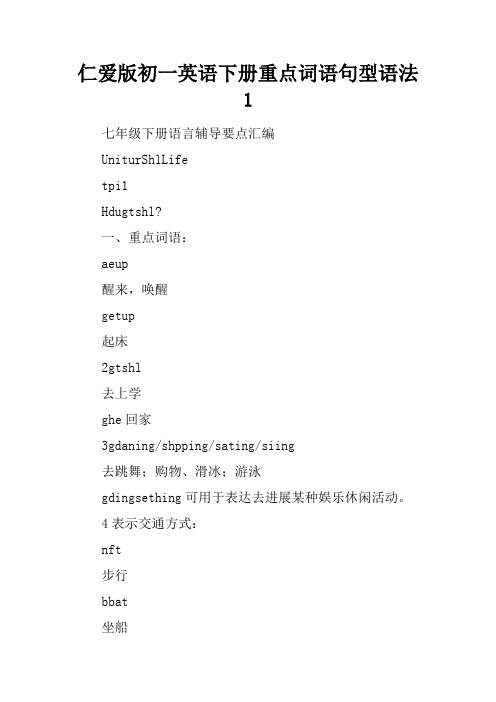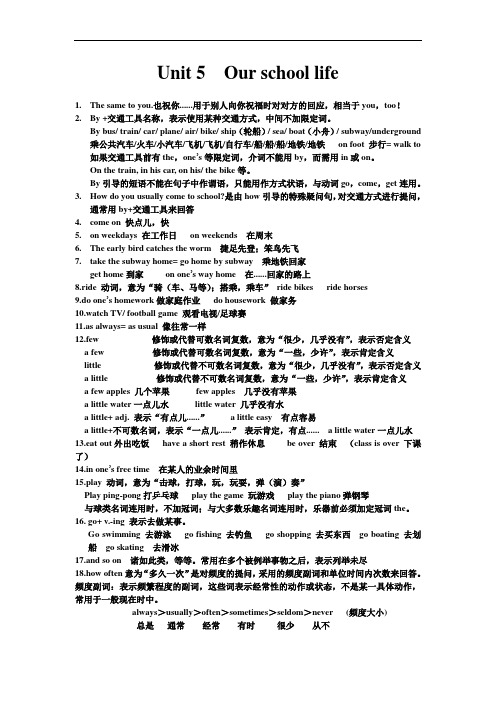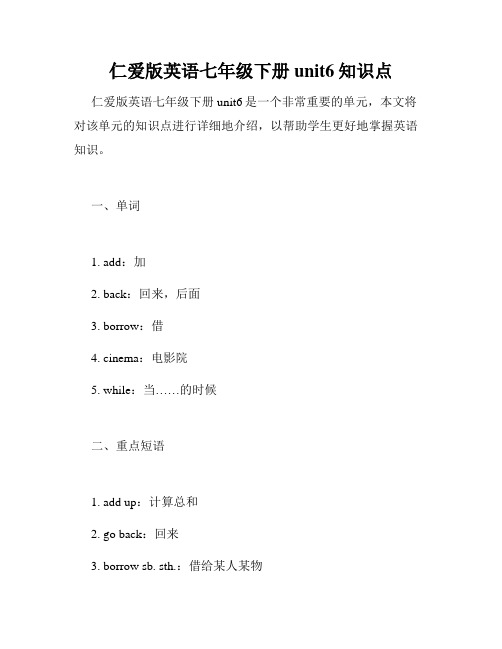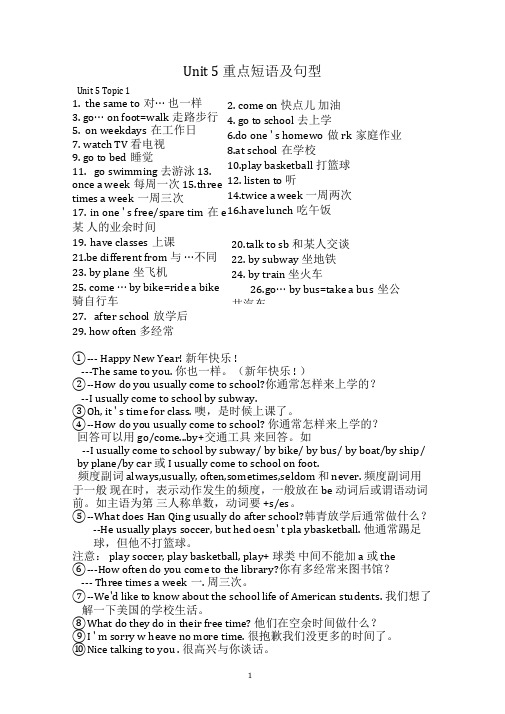仁爱英语七年级下重点短语及句型
七下仁爱英语重点句型

七下英语重点句型以下是七年级下册英语重点句型:1. 一般过去时的陈述句She was born in 1990.2. 一般过去时的疑问句Was she born in 1990?3. 现在进行时态的陈述句I am studying English now.4. 现在进行时态的疑问句Are you studying English now?5. 一般现在时态的陈述句He always helps me with my homework.6. 一般现在时态的疑问句Does he always help you with your homework?7. 一般将来时态的陈述句I will visit my grandparents next week.8. 一般将来时态的疑问句Will you visit your grandparents next week? 9. 祈使句的陈述句Please close the door.10. 祈使句的疑问句Will you close the door?11. 反意疑问句的陈述句She said that she would come to the party.12. 反意疑问句的疑问部分Did she come to the party?13. 条件句的陈述句If it rains, we will stay at home.14. 条件句的疑问句Will we stay at home if it rains?15. 比较结构的陈述句She is taller than her sister.16. 比较结构的疑问句Is she taller than her sister?17. 从句的陈述句When I was a child, I loved to read books.18. 从句的疑问句Did you love to read books when you were a child?19. 定语从句的陈述句The girl who is sitting next to me is my sister. 20. 定语从句的疑问句Which book are you reading?。
仁爱版初一英语下册重点词语句型语法1

仁爱版初一英语下册重点词语句型语法1七年级下册语言辅导要点汇编UniturShlLifetpi1Hdugtshl?一、重点词语:aeup醒来,唤醒getup起床2gtshl去上学ghe回家3gdaning/shpping/sating/siing去跳舞;购物、滑冰;游泳gdingsething可用于表达去进展某种娱乐休闲活动。
4表示交通方式:nft步行bbat坐船bship坐船bair乘飞机bplane乘飞机btrain坐火车bsuba搭乘地铁bar坐小汽车bbus坐公共汽车bbie骑自行车taethesuba/bus/ar搭乘地铁;公共汽车;小汽车6driveaartr=gtrbar驾车去上班taeabustr=gtrbbus乘公共汽车去上班gtshlnft=altshl步行去上学7rideabie/hrse骑自行车;骑马8aftershl/lass放学以后;下以后9plathepian/guitar/vilin弹钢琴;吉他;小提琴plabasetball/ser/ftball 打篮球;踢足球;打橄榄球plaputergaes玩电脑游戏plaithaputer玩电脑plasprts做运动0nextt紧挨着,在…旁边1aplanfshl一幅我们学校的平面图2needas在工作日ateeends在周末3havebreafast/lunh/supper/dinner/eals 吃早餐;中餐;晚餐;正餐;一日三餐havelasses/lessns/aeeting上;上;开会4athTV/vies/gaes/theanials看电视;电影;比赛;动物readnvels/nespapers/bs看小说;报纸;书ashne’sfae/lthes洗脸;衣服6反义词:up–dn,earl–late近义词:quil–fastgetupearl早起belatefr迟到7thefirst/send/third/furthda第一;二;三;四天8leanthehuse清扫房子9表示建筑物〔尤其学校建筑物〕:ntheplagrund在操场atshl/he/table在学校;家里;桌旁inaputerr/teahers’ffie/lassrbuilding/g/librar/lab/anteen在电脑室;老师办公室;教学楼;体操馆;图书馆;实验室;食堂20arundsix’l=atabutsix’l大约在六点21频率副词:never,seld,seties,ften,usuall,alas二、重点句型:It’stietgetup该起床的时候了。
(完整版)仁爱版七年级英语下册知识点总结

Unit 5 Our school life1.The same to you.也祝你......用于别人向你祝福时对对方的回应,相当于you,too!2.By +交通工具名称,表示使用某种交通方式,中间不加限定词。
By bus/ train/ car/ plane/ air/ bike/ ship(轮船)/ sea/ boat(小舟)/ subway/underground 乘公共汽车/火车/小汽车/飞机/飞机/自行车/船/船/船/地铁/地铁on foot 步行= walk to 如果交通工具前有the,one’s等限定词,介词不能用by,而需用in或on。
On the train, in his car, on his/ the bike等。
By引导的短语不能在句子中作谓语,只能用作方式状语,与动词go,come,get连用。
3.How do you usually come to school?是由how引导的特殊疑问句,对交通方式进行提问,通常用by+交通工具来回答e on 快点儿,快5.on weekdays 在工作日on weekends 在周末6.The early bird catches the worm 捷足先登;笨鸟先飞7.take the subway home= go home by subway 乘地铁回家get home到家on one’s way home 在......回家的路上8.ride 动词,意为“骑(车、马等);搭乘,乘车”ride bikes ride horses9.do one’s homework做家庭作业do housework 做家务10.watch TV/ football game 观看电视/足球赛11.as always= as usual 像往常一样12.few 修饰或代替可数名词复数,意为“很少,几乎没有”,表示否定含义a few 修饰或代替可数名词复数,意为“一些,少许”,表示肯定含义little 修饰或代替不可数名词复数,意为“很少,几乎没有”,表示否定含义a little 修饰或代替不可数名词复数,意为“一些,少许”,表示肯定含义a few apples 几个苹果few apples 几乎没有苹果a little water一点儿水little water 几乎没有水a little+ adj. 表示“有点儿......” a little easy 有点容易a little+不可数名词,表示“一点儿......”表示肯定,有点...... a little water一点儿水13.eat out外出吃饭have a short rest 稍作休息be over 结束(class is over 下课了)14.in one’s free time 在某人的业余时间里15.play 动词,意为“击球,打球,玩,玩耍,弹(演)奏”Play ping-pong打乒乓球play the game 玩游戏play the piano弹钢琴与球类名词连用时,不加冠词;与大多数乐趣名词连用时,乐器前必须加定冠词the。
仁爱版英语七年级下册unit6知识点

仁爱版英语七年级下册unit6知识点仁爱版英语七年级下册unit6是一个非常重要的单元,本文将对该单元的知识点进行详细地介绍,以帮助学生更好地掌握英语知识。
一、单词
1. add:加
2. back:回来,后面
3. borrow:借
4. cinema:电影院
5. while:当……的时候
二、重点短语
1. add up:计算总和
2. go back:回来
3. borrow sb. sth.:借给某人某物
4. go to the cinema:去电影院
5. while doing:在做……的时候
三、语法
1. There be句型
There be句型表示“有”、“存在”之意,例如:There is a book on the desk.即桌子上有一本书。
2. 句型I'm + doing sth.
这种结构常用来表达我们正在做某件事情,例如:I'm playing basketball. 即我正在打篮球。
四、例句
1. There is a cinema near our school.(我们学校附近有一家电影院。
)
2. I'm studying English while listening to music.(我边听音乐边学英语。
)
3. Can I borrow your pen for a moment?(我可以借用你的笔一下吗?)
总结
通过对仁爱版英语七年级下册unit6的学习,我们了解了很多单词、短语和语法结构。
好的掌握这些知识点,一定会对我们的英语学习帮助很大。
希望大家能够认真学习,并不断提高自己的英语能力。
仁爱版英语七下册重点句型总结

重点句型1.How do/does sb. go/come to...?2. How often do/does sb. do sth?3.What time do/does 主语do sth?4.What be +主语+doing?5.Where be +主语?6.How long can I keep...?7.How long is the computer? 8.What’s+介词短语?9.How many lessons do/does +主语+have every day? 10.What do you think of math?11.Why do/does +主语+like...?12.How many English classes/lessons do/does+主语+have every day?13.Which subject so you like best?14.Why not=Why don’t you +do...?15.How many +可数名词复数+are there+介词短语?16.How much+不可数名词+is there+介词短语?17.Is there +a+单数名词+介词短语?18. Is there+不可数名词+介词短语?19.Are there+可数名词复数+介词短语?20.What kind of home do you live in?21.Would you like me to help you?22.Excuse me, is there a...near here?23.Excuse me, how can I get to ...?24.Excuse me, which is the way to...?25.Excuse me, could you tell me the way to...?26.Excuse me, where is ...?27.How far is it from here?28.When was +单数主语+born?29.When were+复数主语+born?30.Where was +单数主语+born?31.Where were+复数主语+born?33.When is +形代/名词所有格+birthday?34.What day is it today?35. What day was it yesterday?36.What is the date today?37.What was the date yesterday?38.How do you plan to celebrate your birthday?39.What shape is...?=== What’s the shape of...?40.How wide is...?41.41.What do/does+主语+use ...for?42.What would you like to do at Kangkang’s birthday party?43.Do you want to sing Chinese songs or English songs?44.Can you play soccer or play the piano?45.What (else) can +主语+ do?46What could +主语+do when +主语+was/were +岁数?=What could +主语+do at the age of+岁数?47.How was your birthday?48.48.Did +主语+do...?49.What did+主语+do?50.50. What’s the matter (with sb/sth)?==What’s wrong (with sb/sth)?51.What time did you come back home last night?52.What’s the weather like today?= How is the weather today?53What was the weather like yesterday?=How was the weather yesterday?54.What’s the temperature in Beijing today?55.55.Which season do you like best?56.Where would you like to go?57.How do you plan to go there?58.Who would you like to go with?59.What places of interest would you like to visit?60.The summer holidays are coming.61.People can enjoy an eight-day holiday.62.Many people go to Tian’anmen Square to watch the national flag go up.63.Could you tell me something about...?64.Please give my best wishes to your parents.65.Children put on their clothes and greet their parents on the first day of lunar new year.66.The stay up and enjoy dumplings at midnight for good luck.ter that day, families usually have a get-together with a special dinner.68.They decorate Christmas trees with colorful lights, balls,stars and so on.69.Children put up stockings by the fireplace or at the end of their beds.70.People show their love for their mother by giving cards or presents.71.The boy often plays tricks on his classmates.72.You’d better know about the weather in different places in August.73.You shouldn’t stay in the sun too long.74.Don’t be late for school.75.I plan to take a trip to Mount Tai and take some photos.76.It sounds interesting.77.What’s the best time to go to Australia?78.What should I take with me?79.Each of us has a good plan for the holidays.80.We had a good time at the party last night.81.It’s rainy today, but it was sunny and warm yesterday.82.Everything comes back to life in spring.83.The farmers are busy harvesting in fall.84.Remember to put on your raincoat when you go outside85.The lowest temperature is -8 ℃ and the highest temperature is -2℃==The temperature is between -8 ℃ and -2℃= The temperature is from -8 ℃ to -2 ℃86.It’s the best time to climb hills.87.It’s a good time/season to do sth=It’s a good time/season for sth/doing sth.88.My mother bought a guitar for me yesterday.89. I made a model plane by hand last night.90.He made a wish and blew out the candles.91.I missed the chair and fell down.92.There was something wrong with her eyes when she was six.93.With my father’s help, I can swim now.94.I’m sure we’ll have agood time at the party.95.We use an Mp3 to listen to music.96.Go along this street and turn left at the second crossing. Walk on and across the bridge. It’s on you right You can’t miss it.97.You need to take the No.718 bus and then change to Bus No 106.98.There are many old people living here.99.It’s a townhouse with two floors.100.There is a lamp, some water and two books on the table.101.We are planning to go on a trip.102.She is cleaning the blackboard at the back of the classroom.103.We often do our homework in our free time.104.I think English is easy and interesting.105My teachers and classmates are kind/friendly to me.106She always walks to school.107 Mr. Lee fly yo Beijing twice a month.108.Y ou can keep my bike for two days.三、一般过去时随堂练习:一、用be动词的适当形式填空1.Yesterday______the first of June. It _____Children's Day. All the students ______ very excited.(be)2. She _______(be) happy yesterday.3. They _______ (be)glad to see each other last month.4. There ________(be) a sign on the chair last Monday.5.At the age of 6,my father________(have) to make money.6. ________(can) Tom perform magic tricks 5 years ago.二、句型变换1 There was a car in front of the house just now.否定句:_____________________________________________________一般疑问句:__________________________________________________肯定回答:____________________________________________________否定回答:____________________________________________________2 They played football on the playground.否定句:______________________________________________________一般疑问句:__________________________________________________肯定回答:____________________________________________________否定回答:____________________________________________________三、用所给动词的适当形式填空1. _______ he ______ the flowers this morning? Yes, he _____. (water)2. Her father _______ (read) a newspaper last night.3. We _________ to zoo yesterday. (go)4. ______ you _______ (visit) your relatives last Spring Festival?5. Gao Shan _______ (pull) up carrots last National Day holiday.6. I ____________ (sweep) the floor yesterday.7. What _________ she _________ (find) in the garden last morning?8. It _________ (be) Ben's birthday last Friday9. We all _________ (have) a good time last night.10. He _________ (jump) high last Sports Day.11. She likes _______ newspapers, but she ______ a book yesterday. (read)12. Jim's mother _________ (plant) trees just now.13. I _______ (watch) a cartoon last Monday.14. It ____ (be) the 2nd of November yesterday.15. Gao Shan ________ (put) the book on his head a moment ago.16. Don't ______ the house. Mum _______ it yesterday. (clean)17. What _________ you ______ just now? I ______ some housework. (do)18. They _________ (make) a kite a week ago.19. I want to _____ apples. But my dad _____ all of them last month. (pick)(四)一般将来时1.定义:一般将来时表示要在将来的某个时间内发生,是―纯粹的将来动作‖,或表说话人的意图、打算或某种可能性3.按计划要发生的动作或命令他人做某事常与一般过去时常与表示过去的时间状语连用,如:明天(tomorrow)明天晚上(tomorrow morning),下个星期(next week),下个月(next month),后天(the day after tomorrow),在将来(in the future),这个星期天(this Sunday) 在2050年(in 2050)三天后(three days later),三天内(in five days),今晚(toning),在这个星期天下午(this Sunday afternoon), 很快(soon)等时间状语连用2.结构:(1).由will +v.动词原形构成,will的否定是(will not=won’t)e.g. I will not be free tomorrow .我明天没空。
(完整版)仁爱英语七年级下重点短语及句型

Unit 5 重点短语及句型Unit 5 Topic 11. the same to 对⋯ 也一样 3. go ⋯ on foot=walk 走路步行 5. on weekdays 在工作日 7. watch TV 看电视 9. go to bed 睡觉 11. go swimming 去游泳 13.once a week 每周一次 15.three times a week 一周三次17. in one ' s free/spare tim 在e 某 人的业余时间19. have classes 上课 21.be different from 与 ⋯不同 23. by plane 坐飞机 25. come ⋯ by bike=ride a bike 骑自行车 27. after school 放学后29. how often 多经常① --- Happy New Year! 新年快乐 !---The same to you. 你也一样。
(新年快乐 ! ) ② --How do you usually come to school?你通常怎样来上学的?--I usually come to school by subway. ③ O h, it ' s time for class. 噢,是时候上课了。
④ --How do you usually come to school? 你通常怎样来上学的?回答可以用 go/come...by+交通工具 来回答。
如--I usually come to school by subway/ by bike/ by bus/ by boat/by ship/ by plane/by car 或 I usually come to school on foot.频度副词 always,usually, often,sometimes,seldom 和 never. 频度副词用于一般 现在时,表示动作发生的频度,一般放在 be 动词后或谓语动词前。
仁爱英语七年级下册重点句子整理
Unit5Topic11.How do you usually come to school ?---- I usually come to school bysubway/bus/car/bike/train/plane/ship/boat.2.It’s time for class= It’s time to have class.3.What time do you usually get up on weekdays?---- I always get up atsix o’clock.4.I seldom walk to school.频度副词:always>usually>often>sometimes>seldom>never5.How often do you come to the library?Topic21.Are you doing your homework ?2 . May I borrow some English workbooks?3. How long can I keep them ?4. You must return them on time.5 .Do you have any English newspaper ?---- Sorry, we don’t have any.6.A few students are running around the playground.7.She is cleaning the blackboard at the back of the classroom.Topic31What day is it today ?2.What class are they having ?3.What time is the class over ?4.What time does the next class begin ?5.How many lessons does he have every weekday ?6.It's 10:20 on Thursday morning now.8.I think you must like English very much.9.What do you think of it ?= How do you like it ?10.W hich subject do you like best ? ---- I like …. best.11.I like history best , because I think it’s easy and interesting.12.I don’t like math. I think it’s a little difficult and boring.13.A t school, my teachers and classmates are very kind to me.14.M y school life is very interesting.15.I study Chinese, English, math and some other subjects.16.It's my favorite outdoor activity.16.A ttention, please !17.T here is a soccer game between Class One and Class Two.18.D o you want to see different kinds of stamps ?Unit6Topic 11. Where is your bedroom?-----It's on the second floor.2. There is a study next to my bedroom .3. There is a sofa, a desk, some books and so on .4. Why not go upstairs and have a look ?5. Is there a computer in your study ?6. Are there any English books in your study ?7. There is one next to my family photo on the wall.8. There are so many books on the shelves.9. What’s i n front of the classroom ?10. Put them away , please .11. You must look after your things .12. There aren’t any trees .13. Now I’m helping my father clean the study.14. How many model planes are there ? / How much water is there ?15. What kind of home do you live in ?16. They live in a big farmhouse in the country .17. How many floors are there in your buildings ?18. Look for a quiet room for two two people under 500 yuan .19. Call Bob at 139-7382-4946.20. Would you like me to help you ?21. I’m looking for a store . Are there any near here ?22. Mr.Smart lives at the end of Park Road.23. There are many old people living here.24. There are many shops and restaurants close to my home.25. Our school is not far from here .26. Excuse me , where is the library ?/Is there a library near here ?which is the way to the library ?how can I get to the hospital ?could you tell me the way to the library ?19.T he bookstore is across from the school.20.T he library is on the corner of Xinhua Street and Zhongshan Road.21.You can’t miss it.22.H ow far is it from here ?------It’s about 15 kilometers away from here.23.You should change to the No.108 bus.24.E very year many people get hurt or lose their lives in traffic accidents.25.We must stop and look both ways .26.W e must never play on the street.27.It’s good to help children and other people cross the street.Unit7Topic 1Topic 2Topic 3Unit 8 Topic 1Topic 2。
仁爱版英语七年级下全部知识点总结
七年级下英语知识点总结Unit 5 Topic1㈠短语总结1.在学校大门口 at the school gate2.来学校 come to school3.去学校 go to school4.上课 have class / have classes5.步行 on foot6.骑自行车 ride a bike/ ride bikes/ bybike / on a bike7.坐公交 by bus / take a bus8.坐地铁 by subway / take the subway /on the subway9.坐飞机 by plane/ take the plane / onthe plane10.坐小汽车 by car / in a car/ take a car/drive a car11.坐轮船 by ship12.坐小船 by boat13.坐火车 by train / on the train14.在我们组 in our group15.一群学生 a group of students16.我们中的三个人 three of us17.在平日 on weekdays18.在周末 on the weekends / at weekends19.起床 get up20.睡觉 go to bed21.早起 get up early 22.回家 go home23.到家 get home24.去动物园 go to the zoo25.去公园 go to the park26.看电影 see a movie / film27.看电视 watch TV28.在晚上 in the evening / at night29.帮助父母 help parents30.做某人的家庭作业 do one’s ( my/ her/his/ your/ their)homework31.在学校 at school32.知道,了解 know about / learn about33.校园生活 school life34.一个美国学生 an American student35.在美国 in America / in the 许多学生 manystudents/ a lot of students/ lots of students36.很少 very few37.吃午饭 have lunch38.出去吃饭 eat out39.在校期间 on school days40.休息一会 have a short rest/ break41.午饭后 after lunch42.在某人的业余时间in one’s ( my/ his/ her/their…)free/ spare time43.打篮球 play basketball44.踢足球play soccer / football45.弹钢琴 play the piano46.弹吉他play the guitar47.拉二胡 play erhu48.去游泳 go swimming / go for a swim49.去划船 go boating50.球赛 a ball game / ball games51.一年四次 four times a year52.听音乐 listen to music53.读书 read books54.看报 read newspapers 55.看医生 see a doctor56.去图书馆 go to the library57.一周两次 twice a week58.见朋友 meet friends59.每天 every day60.在七点半 at half past seven61.一小会 for a little while / for a shorttime62.晚饭后 after supper63.吃饭 have dinner64.吃早饭 have breakfast㈡重要句型1.I usually come to school by subway.同义句: I usually take the subway to school.对划线部分提问: How do you usually come to school类似的有:go to school by bike=go to schoolon a bike= ride a bike to school=ride to schoolgo home by bus=go home on a bus=take a bus home2.How do you usually/ often…你通常/经常怎样…3.It’s time for class.=It’s time to haveclass. =It’s time for having class.4.What about you =How about you5.How often …询问频率,回答可以用频率副词:always, usually, often, sometimes, seldom, never, every day ,every +其他时间名词或表示频率的短语回答表示频率的短语:次数+单位时间. : once a day / twice a week / three timesa month6. The early bird catches the work. (谚语) 笨鸟先飞7. Work / Study must come first. 工作/ 学习必须放在第一位!8. Classes begin at eight. =Class begins at eight.提问: What time does the class begin / What time do the classes begin㈢重要单词的用法1.look (感官动词) 看起来,后面加形容词His mother looks very young.They look very cute.Her dress looks very nice.You look very cool in this coat.2.by 介词by 后面直接加表示交通工具的名词,中间不用任何词修饰,如:by bikeby +动词ing形式,表示通过某种方式People show love to their mothers by giving cards.You can be a good student by working hard.3.over (形容词)School / Class is over.4.begin现在分词: beginning 过去式: beganbegin to do sth , begin doing sthHe begins to write a letter. =He begins writing a letter.如果begin本身为分词,只能用begin to do sthHe is beginning to run.5.listen to 听(动作), hear 听见(结果)6.always 反义词 never7.本话题涉及的时态为一般现在时,句中常有频率副词或表示频率的短语,如果主语为三单,动词一定要用三单!(四)易错题1.You new watch ______ (look) very nice!2.Here ______(be) some news.3.Oh, come on! It’s time_____ going toschool.4.They usually go to school on________(feet).5.In my class, forty of _______(we) go toschool by bike.6.The early bird ______ (catch) the worm.7.Kangkang often _____ (ride) a bike to thepark.8.What time _____ (be)school over9.Work must come ______(once).10.It’s time ____you to get up.11.We often _____ books in the morning.12.Jill’s friend like ______(study) in ourschool.13.Mr. Wang teaches ______(we) English._____ of us like him.14.How about ______(go) out with me15.Most students go to school _____ theschool bus.16._______ do you go shopping with yourmotherA. How soonB. How farC. How oftenD. How much17.What time do you usually get up _____weekdays18.He ______ busy, so he has no time to playwith us.A. is alwaysB. seldom isC. always isD. often is19. The last class______(finish) at twelve o’clock.20. Let’s go______(boat).21. It’s time to have breakfast. (同义句) _________________________________________ _____________.22. Michael often rides a bike to school. (同义句)_________________________________________ _____________.23. I always go to work on foot. (对划线部分提问)_________________________________________ _____________.24. My mother goes shopping twice a week. (对划线部分提问)_________________________________________ _____________.25. Mary always reads books in the library. (反义句)_________________________________________ _____________.26. He usually does his homework at school. (否定句)_________________________________________ _____________.27. They often go to school by bus in the morning. (对划线部分提问)_________________________________________ _____________.28. Jane seldom watches TV on weekdays. (改为一般疑问句)_________________________________________ _____________.29. He usually has lunch at home. (对划线部分提问)_________________________________________ _____________.30. Li Ping often goes to work on foot. (同义句)_________________________________________ _____________.31. 几乎没有学生乘地铁去学校。
仁爱版七年级下册英语复习知识点
仁爱版七年级下册英语复习知识点仁爱版七年级下册英语复习知识1重点语法There be句型Wh-questions重点句型What’s your home like? What’s the matter?Sorry, I can’t hear you. I’ll get someone to check it right now.There is something wrong with mykitchen fan.重点讲解1 house with three bedrooms.有三间卧室的房子。
with “有,带有”。
with还可以意为“和(某人/某物)在一起”2 apartment for a family of two.适合两口之家的公寓。
(1) for表示“给……”表示目的或功能。
后接物主代词或名词,但通常带’s.或者后接表示无生命物体的名词。
Here is a letter foryou.(2)of的含义为“属于某人/某事物”。
She is a friend of Lily’s. = She is Lily’s friend.3 What’s the matter?怎么了?该句常用来询问某或某物出了什么什么问题或毛病;询问具体某人或某物出了什么问题时,还可以表达为:What’s the matter with sb./sth.某人或某物出了什么毛病。
What’s the matter? = What’swrong?4 Ihear you playing the piano.我听见你在弹钢琴。
hear…doing sth.“听见……在做某事”,强调正在进行的动作。
hear…dosth.“听见……做了某事”,强调全过程。
hearabout sth.听到关于某事物的消息 hear from sb.接到某人的来信、电话等hear of sb./sth.听到或知道某人或某事物的情况5 a lot of = lots of许多后接可数名词,相当于many;后接不可数名词,相当于much,用于肯定句中;但是注意:如果是否定句,则常用many或much.6 be far from… 离……远(抽象距离)be…away from…离……远(具体距离)My school is not far from thebookstore. The sea is 2 miles away fromthe hotel.7 There is something wrong with sb./sth.某人或某物出问题/有毛病了。
仁爱版英语七年级下册知识点归纳(完整版)
仁爱版英语七年级下册知识点归纳(完整版)-CAL-FENGHAI-(2020YEAR-YICAI)_JINGBIAN仁爱版英语七年级下册知识点归纳?英语七年级下册知识点归纳Unit?5?Topic1?重点语法一般现在时(常与频度副词never,?seldom,?sometimes,?often ,usually,?always等连用)重点句型?—How?do?you?usually?come?to?school???—I?usually?come?to?school?by?subway.????????????—How?often?do?you?go?to?the?library????—Once/Twice/Three?times?a?week/Very?often/Every?day/Seldom重点详解1I?always?come?to?school?by?bus.???by+交通工具名称,表示使用某种交通方式,中间不加限定词,如果交通工具前有a,?the,?my?等限定词,就不能用by,而是用in或是on.???on?the?train=by?train???on?his?bike=by?bike???in?my?car=by?car.???巧辩异同on?foot?与?walk????on?foot?“走路”,是介词短语,不能作谓语,只作方式状语,位于句末。
??walk?“走路”,是动词,可以作谓语。
? ? ??go?to…on?foot=?walk?to? ? ???I?often?go?to?school?on?foot.?=I?often?walk?to?school.?????同样,go?to….by?bike?=?ride?a?bike?to?????? ? ? ? ? go?to….?by?car?=?drive?a?car?to????????? ??go?to?…?by?plane?=?fly?to????????? ? ? ? ? go?to…?by?bus?=?take?a?bus?to2???Come?on!?It’s?time?for?class.???????come?on?“快点,加油,来吧”。
- 1、下载文档前请自行甄别文档内容的完整性,平台不提供额外的编辑、内容补充、找答案等附加服务。
- 2、"仅部分预览"的文档,不可在线预览部分如存在完整性等问题,可反馈申请退款(可完整预览的文档不适用该条件!)。
- 3、如文档侵犯您的权益,请联系客服反馈,我们会尽快为您处理(人工客服工作时间:9:00-18:30)。
Unit 5重点短语及句型Unit 5 Topic 11. the same to对…也一样2. come on 快点儿加油3.go…on foot=walk 走路步行4. go to school 去上学5. on weekdays在工作日6.do one’s homework做家庭作业7.watch TV看电视8.at school在学校9.go to bed睡觉10.play basketball 打篮球11.go swimming去游泳12. listen to听13. once a week每周一次14.twice a week 一周两次15.three times a week一周三次16.have lunch吃午饭17. in one’s free/spare time 在某人的业余时间18. the Great Wall长城19. have classes上课20.talk to sb 和某人交谈21.be different from 与…不同22. by subway坐地铁23. by plane坐飞机24. by train坐火车25. come …by bike=ride a bike骑自行车26.go…by bus=take a bus坐公共汽车27.after school放学后28. for a short time 一段短时间29. how often 多经常①--- Happy New Year! 新年快乐!---The same to you. 你也一样。
(新年快乐!)②--How do you usually come to school?你通常怎样来上学的?--I usually come to school by subway.③ Oh, it’s time for class. 噢,是时候上课了。
④--How do you usually come to school?你通常怎样来上学的?回答可以用go/come...by+交通工具来回答。
如--I usually come to school by subway/ by bike/ by bus/ by boat/by ship/ by plane/by car或I usually come to school on foot.频度副词always,usually, often,sometimes,seldom 和never. 频度副词用于一般现在时,表示动作发生的频度,一般放在be动词后或谓语动词前。
如主语为第三人称单数,动词要+s/es。
⑤--What does Han Qing usually do after school?韩青放学后通常做什么?--He usually plays soccer, but he doesn’t play basketball.他通常踢足球,但他不打篮球。
注意:play soccer, play basketball, play+球类中间不能加a或the⑥---How often do you come to the library?你有多经常来图书馆?--- Three times a week.一周三次。
⑦--We’d like to know about the school life of American students.我们想了解一下美国的学校生活。
⑧What do they do in their free time?他们在空余时间做什么?⑨I’m sorry we have no more time. 很抱歉我们没更多的时间了。
⑩Nice talking to you.很高兴与你谈话。
Unit 5 Topic 21.make cards 制作卡片2.dining hall 餐厅3.swimming pool 游泳池4.do some cleaning打扫卫生5. of course 当然6. look for寻找7.on the shelf 在架子上8. on time准时按时9.show sb around 领某人参观10.a few 一些,少量11.at the back of 在…的背后12.draw pictures 绘画13. on the playground在操场上14.in the gym在健身房15. borrow sth from sb 向某人借某物16. look for 寻找17.have a soccer game 进行一场足球比赛18. one day 有一天①--What are you doing now?你现在在做什么?②Are you doing your homework?你现在正在做作业吗?③ I’m making cards. 我正在制作卡片。
④Excuse me, may I borrow some English workbooks?打扰了,我可以借一些英语练习册吗?borrow sth. from sb.向某人借某物(借入)lend sth. to sb.借某物给某人(借出)⑤How long can I keep them?我可以借(这些书)多久呢?用How long 提问,只能用延续性动词keep回答,keep 在这里也是“借”的意思,Borrow和lend都是短暂性动词,不能与表示持续的时间状语连用。
如I want to borrow the book for two day s. ( × )I want to keep the book for two days. ( √ )⑥The girl looks for the books on the shelves.那个女孩在书架上找书。
⑦A few students are running around the playground.一些学生正在围绕操场跑步。
A few 表示一些,几个,表示肯定。
Few表示“很少,几乎没有”表示否定。
两者都可以修饰可数名词的复数形式。
如:I have a few friends.我有一些朋友。
He is new here, he has few friends here. 他是新来的,他几乎没有朋友。
⑧The boy is drawing pictures. He isn’t cleaning the blackboard.那个男孩正在画画,他不是在擦黑板。
现在进行时的基本结构是be+v.ing, 否定形式是在Be动词后加not.⑨He looks happy because he loves swimming.他看起来很高兴因为他很爱有用。
Because意为“因为,因此”引导一个原因状语从句。
⑩I also want to visit it one day.我也想有一天去参观长城。
also意为“也”,一般放在句中;too也是“也”,但too放在句子末尾,前面用逗号隔开,either 用于否定句。
如:He likes reading, he also likes swimming.(also用于句中)He likes swimming, I like swimming, too.(too 用于肯定句)He doesn’t like swimming, I don’t like swimming, either.(either用于否定句)Unit 5 Topic 31. think of 认为2. work on致力于3.talk about 谈论4.be kind to sb对某人友好5.some other subjects 其他一些科目6.outdoor activity 户外活动7.tell sb about sth 告诉某人关于某事8.between…and在…和…之间9.from… to 从…到…10. learn sth from sb 从/向某人学习某事11. have a music class 上音乐课12. the next class 下一节课13.help each other 互相帮助14. like…best 最喜欢15.speak English with sb 和某人说英语16. thank you for doing sth谢谢你做某事①What day is it today? 今天是星期几?②—What class are they having? ----他们在上什么课?—They are having a music class. ----他们在上音乐课。
③What time does the next class begin? 下一节课什么时候开始?④H ow many lessons does he have every weekday?他每个平日要上多少节课?⑤I think you must like English very much. 我想你一定很喜欢英语。
⑥—What do you think of it? ----你认为它(英语)怎么样?—I don’t like it. It’s a little difficult.----我不喜欢。
它有点难。
⑦I like history very much because it’s very interesting.我非常喜欢历史,因为它很有趣。
⑧It’s time for class. 该上课了。
⑨—Which subject do you like best?你最喜欢哪门科目?—I like history best. 我最喜欢历史。
⑩At school, my teachers and classmates are very kind to me.be kind to...意为“对......友好”,相当于be friendly/nice to ...。
kind也可作名词,意为“种类”,如many different kinds of... 许多不同种类的......⒒I study Chinese, English, math, politics, art, history, geography, biology and some other subjects.other指“另外的,其他的”,常与复数名词或不可数名词连用,如:I like Lucy and some other students.我喜欢Lucy和一些其他同学。
⒓I can learn a lot from it. 我能从中学到很多(知识)。
⒔Thank you for your hard work. 感谢你的努力。
